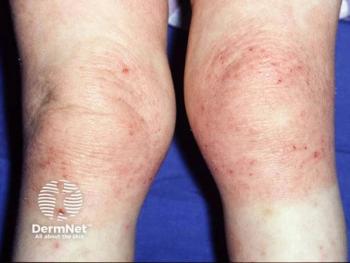
Diet matters in atopic dermatitis
The narrative about food, diet and atopic dermatitis recently changed significantly after publication of the Learning Early About Peanut study, says Peter Lio, M.D. Diet matters, and he discusses in what ways.
Dermatologists who think diet and food don’t matter in atopic dermatitis should think again, according to Peter A. Lio, M.D., clinical assistant professor of dermatology and pediatrics at Northwestern University’s Feinberg School of Medicine in Chicago.
“Food and diet matter, if for no other reason than the fact that our patients really want to know about it and discuss it,” Dr. Lio says. “There is no doubt that true food allergy is a significant problem for patients with atopic dermatitis, affecting some one-third of patients with moderate-to-severe atopic dermatitis. Importantly, we find that the vast majority of patients really do not have food-induced atopic dermatitis, but because this entity exists and is very hard to fully exclude, it remains as a specter that haunts many clinical interactions.”
Dr. Lio presented on the topic July 26 during the “Translating Evidence into Practice: Atopic Dermatitis Guidelines” session at the American Academy of Dermatology’s (AAD’s) 2019 Summer Meeting in New York City.
He says the narrative about food, diet and atopic dermatitis recently changed significantly after publication of the Learning Early About Peanut, or LEAP, study.1
“There is more focus than ever, it seems, on the relationship between foods and skin, so having this understanding allows us to better advise our patients,” he says.
Previous thinking on the topic might have put the cart before the horse. Foods do not seem to be driving atopic dermatitis but rather the damaged skin barrier of atopic dermatitis seems to be an important route of becoming allergic to foods via transcutaneous sensitization, according to Dr. Lio.
“Thus, healing the skin barrier may be more important than we even realized, and early introduction to allergenic foods, such as peanut, may actually prevent allergy and allow for proper toleration to such foods,” he says.
Other takeaways for dermatologists on the topic of food, diet and atopic dermatitis, according to Dr. Lio are:
Try not to be dismissive when patients bring up diet. Many patients feel that conventional physicians are dismissive while naturopathic and other holistic providers are much better about addressing and even just listening to such concerns.
Consider breaking it down for the patient in terms of:
A) Very commonly atopic dermatitis patients have "true" food allergy as evidenced by hives, angioedema and anaphylaxis.
“We need to be on the lookout for this, but we know you are not ‘cheating’ with these foods and they are unlikely to be drivers of atopic dermatitis on a regular basis,” he says.
B) Very rarely there is true food-driven atopic dermatitis. But this is very hard to test for, as it would require a double-blind placebo-controlled food challenge that ideally watches patients for a few days after eating an offending food, since the reaction is not always immediate.
“Because these are rare, we try to minimize concerns except in cases that do not seem to respond well to our basic treatment approaches. An important point: Avoiding foods that one is not allergic to can result in harm! It has been shown that exclusion of foods from the diet can result in type I sensitization over time, when those foods are reintroduced,” Dr. Lio says.
C) A third interest area is the notion that some foods are simply inflammatory, contributing to inflammation in the body and skin.
“Here, testing will not show us anything, as [these] are not true allergies. But many people report success with avoidance or at least minimization of such foods. Three common examples include: gluten, dairy, and sugars-all of which may have pro-inflammatory effects on the body. Still, we have to remember the caveat above about sensitization being possible,” Dr. Lio says.
Disclosures:
Dr Lio has consulting, research, speaking, advisory and/or investment relationships with these companies: AbbVie, Altus Labs, Anacor Pharmaceuticals, AOBiome, Dermavant Sciences, Dermira, DermTap, DermVeda, Eli Lilly and Company, Exeltis, Ferndale Laboratories, Franklin BioScience, Galderma Laboratories, gpower, Heel (Biologische Heilmittel Heel GmbH), IntraDerm Pharmaceuticals, Johnson & Johnson Consumer Products Company, Kiniksa Pharmaceuticals, L'Oreal USA, La Fondation pour la Dermatite Atopique (Foundation for Atopic Dermatitis), La Roche-Posay Laboratorie Pharmaceutique, LearnHealth/LearnSkin, Medable, Menlo Therapeutics, Micreos Human Health B.V., Mission, Modernizing Medicine, National Eczema Association, Odeza, Pfizer, Pierre Fabre Dermatologie, Realm Therapeutics, Regeneron, Sanofi US Services, Syncere Skin Systems, Theraplex, UCB, Unilever, Valeant Pharmaceuticals International, Valeant Pharmaceuticals North America and Verrica Pharmaceuticals.
References:
1 Du toit G, Roberts G, Sayre PH, et al. Randomized trial of peanut consumption in infants at risk for peanut allergy. N Engl J Med. 2015;372(9):803-13.
Newsletter
Like what you’re reading? Subscribe to Dermatology Times for weekly updates on therapies, innovations, and real-world practice tips.











